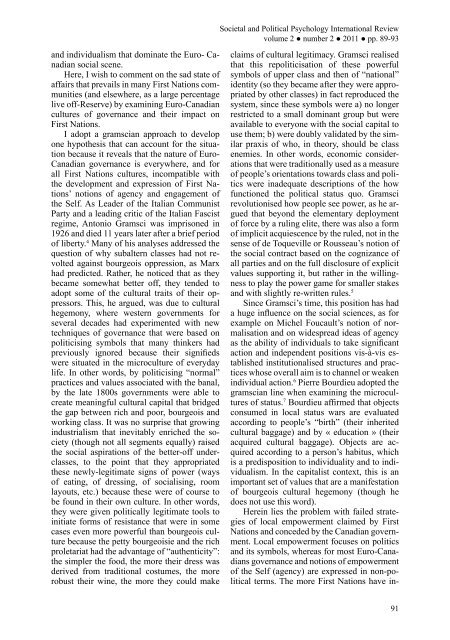State, community, individual - Societal and Political Psychology ...
State, community, individual - Societal and Political Psychology ...
State, community, individual - Societal and Political Psychology ...
You also want an ePaper? Increase the reach of your titles
YUMPU automatically turns print PDFs into web optimized ePapers that Google loves.
<strong>and</strong> <strong>individual</strong>ism that dominate the Euro- Canadian<br />
social scene.<br />
Here, I wish to comment on the sad state of<br />
affairs that prevails in many First Nations communities<br />
(<strong>and</strong> elsewhere, as a large percentage<br />
live off-Reserve) by examining Euro-Canadian<br />
cultures of governance <strong>and</strong> their impact on<br />
First Nations.<br />
I adopt a gramscian approach to develop<br />
one hypothesis that can account for the situation<br />
because it reveals that the nature of Euro-<br />
Canadian governance is everywhere, <strong>and</strong> for<br />
all First Nations cultures, incompatible with<br />
the development <strong>and</strong> expression of First Nations’<br />
notions of agency <strong>and</strong> engagement of<br />
the Self. As Leader of the Italian Communist<br />
Party <strong>and</strong> a leading critic of the Italian Fascist<br />
regime, Antonio Gramsci was imprisoned in<br />
1926 <strong>and</strong> died 11 years later after a brief period<br />
of liberty. 4 Many of his analyses addressed the<br />
question of why subaltern classes had not revolted<br />
against bourgeois oppression, as Marx<br />
had predicted. Rather, he noticed that as they<br />
became somewhat better off, they tended to<br />
adopt some of the cultural traits of their oppressors.<br />
This, he argued, was due to cultural<br />
hegemony, where western governments for<br />
several decades had experimented with new<br />
techniques of governance that were based on<br />
politicising symbols that many thinkers had<br />
previously ignored because their signifi eds<br />
were situated in the microculture of everyday<br />
life. In other words, by politicising “normal”<br />
practices <strong>and</strong> values associated with the banal,<br />
by the late 1800s governments were able to<br />
create meaningful cultural capital that bridged<br />
the gap between rich <strong>and</strong> poor, bourgeois <strong>and</strong><br />
working class. It was no surprise that growing<br />
industrialism that inevitably enriched the society<br />
(though not all segments equally) raised<br />
the social aspirations of the better-off underclasses,<br />
to the point that they appropriated<br />
these newly-legitimate signs of power (ways<br />
of eating, of dressing, of socialising, room<br />
layouts, etc.) because these were of course to<br />
be found in their own culture. In other words,<br />
they were given politically legitimate tools to<br />
initiate forms of resistance that were in some<br />
cases even more powerful than bourgeois culture<br />
because the petty bourgeoisie <strong>and</strong> the rich<br />
proletariat had the advantage of “authenticity”:<br />
the simpler the food, the more their dress was<br />
derived from traditional costumes, the more<br />
robust their wine, the more they could make<br />
<strong>Societal</strong> <strong>and</strong> <strong>Political</strong> <strong>Psychology</strong> International Review<br />
volume 2 ● number 2 ● 2011 ● pp. 89-93<br />
claims of cultural legitimacy. Gramsci realised<br />
that this repoliticisation of these powerful<br />
symbols of upper class <strong>and</strong> then of “national”<br />
identity (so they became after they were appropriated<br />
by other classes) in fact reproduced the<br />
system, since these symbols were a) no longer<br />
restricted to a small dominant group but were<br />
available to everyone with the social capital to<br />
use them; b) were doubly validated by the similar<br />
praxis of who, in theory, should be class<br />
enemies. In other words, economic considerations<br />
that were traditionally used as a measure<br />
of people’s orientations towards class <strong>and</strong> politics<br />
were inadequate descriptions of the how<br />
functioned the political status quo. Gramsci<br />
revolutionised how people see power, as he argued<br />
that beyond the elementary deployment<br />
of force by a ruling elite, there was also a form<br />
of implicit acquiescence by the ruled, not in the<br />
sense of de Toqueville or Rousseau’s notion of<br />
the social contract based on the cognizance of<br />
all parties <strong>and</strong> on the full disclosure of explicit<br />
values supporting it, but rather in the willingness<br />
to play the power game for smaller stakes<br />
<strong>and</strong> with slightly re-written rules. 5<br />
Since Gramsci’s time, this position has had<br />
a huge infl uence on the social sciences, as for<br />
example on Michel Foucault’s notion of normalisation<br />
<strong>and</strong> on widespread ideas of agency<br />
as the ability of <strong>individual</strong>s to take signifi cant<br />
action <strong>and</strong> independent positions vis-à-vis established<br />
institutionalised structures <strong>and</strong> practices<br />
whose overall aim is to channel or weaken<br />
<strong>individual</strong> action. 6 Pierre Bourdieu adopted the<br />
gramscian line when examining the microcultures<br />
of status. 7 Bourdieu affi rmed that objects<br />
consumed in local status wars are evaluated<br />
according to people’s “birth” (their inherited<br />
cultural baggage) <strong>and</strong> by « education » (their<br />
acquired cultural baggage). Objects are acquired<br />
according to a person’s habitus, which<br />
is a predisposition to <strong>individual</strong>ity <strong>and</strong> to <strong>individual</strong>ism.<br />
In the capitalist context, this is an<br />
important set of values that are a manifestation<br />
of bourgeois cultural hegemony (though he<br />
does not use this word).<br />
Herein lies the problem with failed strategies<br />
of local empowerment claimed by First<br />
Nations <strong>and</strong> conceded by the Canadian government.<br />
Local empowerment focuses on politics<br />
<strong>and</strong> its symbols, whereas for most Euro-Canadians<br />
governance <strong>and</strong> notions of empowerment<br />
of the Self (agency) are expressed in non-political<br />
terms. The more First Nations have in-<br />
91


